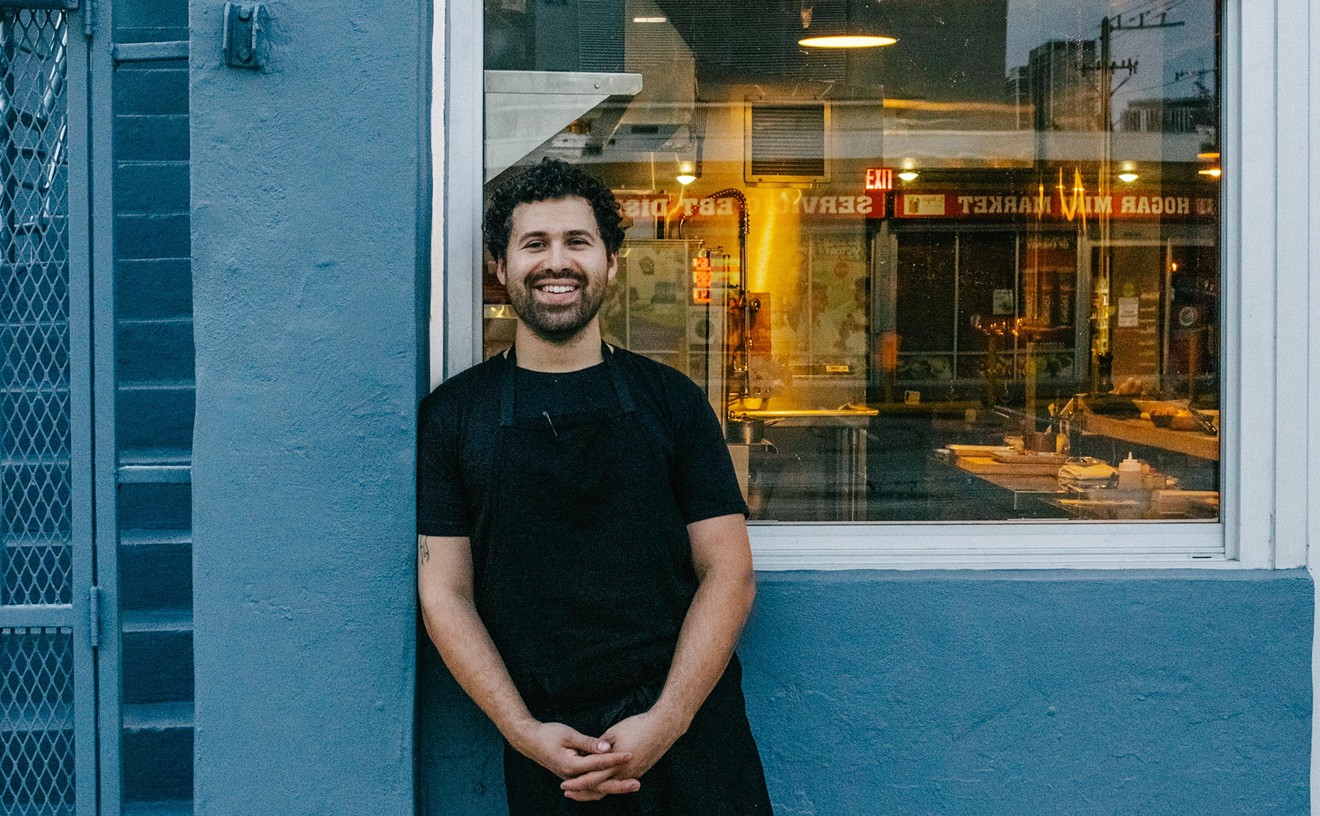Still fiending for more film greatness? Don't sweat it, because the 31st-annual Miami International Film Festival is only half-finished.
Theaters from South Beach to Wynwood to Coral Gables are still screening features long and short, foreign and domestic, starring big names and hot upstarts, with plenty of red-carpeted premieres to go around.
This week, we review thought-provoking documentaries, kitschy love stories, and awkward rooster bromance. Make sure you catch these titles, and check the official schedule for even more movie madness. You've only got till Sunday, so make it count.
All About the Feathers
7 p.m. Friday, March 14, at Regal South Beach, 1120 Lincoln Rd., Miami Beach; and Saturday, March 15, at 4:15 p.m. at Paragon Grove 13, 3015 Grand Ave., Coconut Grove.
One of the trickier brands to pull off in the comedic realm is deadpan humor. A subtle sense of timing is required, and actors must deliver sincere performances without going over-the-top. All About the Feathers, a little film from Costa Rica, achieves this with a warm wit that recalls early Wes Anderson without being too cute about it.
Chalo (Allan Cascante) is a wiry security guard who looks pathetic in his baggy uniform. He works nights on an unoccupied property and dreams of owning a gamecock. He finally gets one by insistently asking his landlord to sell him his rooster, but despite Chalo's devotion, he seems a bit clueless about the bird. He soon builds quirky friendships around the cock, including Candy (Sylvia Sossa), a housemaid who's convinced Chalo would make a killing selling Avon products; and Erlan (Erlan Vásquez), a tall, chubby teen who looks up to Chalo and his assumed talents with the rooster.
First-time director Neto Villalobos, who also wrote and edited the film, shows a keen eye for timing. The film runs a neat 85 minutes. He lets the camera linger on many scenes, building on a rhythm that seems to celebrate a love for the gradually unfolding moment and the Sisyphean myth of persistence, letting the layers of ironic behavior pile up for genuine laughs. — Hans Morgenstern
The Summer of Flying Fish
9:45 p.m. Friday, March 14, and 6:30 p.m. Saturday, March 15, at Regal South Beach.
One of the most atmospherically doom-laden works of this year's MIFF has to be The Summer of Flying Fish. It’s the first feature by Chilean director Marcela Said, whose filmography includes four feature documentaries dating back to 1999 that mostly focus on her home country. It is clear this is a film made with an intense conscience, even if the drama is low-key and sly.
Francisco (Gregory Cohen), a rich Chilean landowner vacationing on his own farmland, has grown obsessed with eradicating an invasive species of carp from his expansive lagoon. Allusions to his frustration with the Mapuche natives are not coincidental. The film's conscience is Francisco's 20-something daughter, Manena (Francisca Walker). She often chastises him for his reckless behavior toward the land and its people. He simply shrugs and tells her to calm down. Yet a sense of a stark force beyond their control permeates the film. The story unfolds dreamily in a fog-drenched world. Droning ambient music often accompanies images of fish dug up from the earth by probing sticks held by unseen hands and mysterious figures intruding across Francisco's land. It's an eerie masterpiece that can only culminate in tragedy as it charges toward an inevitable conclusion that best illustrates the hopeless divide. — Hans Morgenstern
Web Junkie
1 p.m. Saturday, March 15, at Regal South Beach.
Nowadays, most people spend their waking lives looking at and interacting with screens. As more and more devices, apps, and software continue to suck humanity into alternate realities, China stands as the only country to classify internet addiction as a clinical disorder. Does this mean the communist country is actually more progressive and humanitarian than other nations? Quite the contrary is revealed by Web Junkie, the new documentary by Hilla Medalia and Shosh Shlam.
Somehow, these adventuresome filmmakers got their cameras into a rehabilitation camp for young internet addicts that appears to be some kind of cross between a boot camp and an insane asylum. Focusing on three teenage boys who never seem to get enough of online games like World of Warcraft, the filmmakers reveal a stunning disconnect between parents and children and the government's intrusion into child-rearing.
The filmmakers don't seem to intrude and do ask simple questions that cut to their youths' core behavior, in turn relating their subjects to a Western audience. The film has a distant, cinéma vérité feel, and there's no judgment in their lens. By remaining as observational as possible, Web Junkie brilliantly offers a perspective that will feel harrowing and unbelievable to many while remaining honest to the so-called treatment these teens endure. — Hans Morgenstern
Barefoot in the Kitchen (Con La Pata Quebrada)
3:30 p.m. Sunday, March 16, at Regal South Beach.
Whether it's a matter of physical appearance or overt sexuality, women don't have it easy in today's media portrayals. Though modern times usually dictate decent representation of female characters in film and television, that was not always the case.
The documentary Barefoot in the Kitchen (Con La Pata Quebrada) pulls about 180 film clips ranging from the 1930s to the 1980s and shows how women have been portrayed in Spanish media throughout the ages. According to the perspective of Spanish men (and presumably male filmmakers), women are one or a combination of the following: dogs, spinsters, adulterers, prostitutes, baby mamas, sinners, or "the plague." Of course, a woman's only desire is to get married and please her husband, or so the movies would have us believe.
Some of the footage is humorous, and the (male) narrator's voiceover drives the conclusion that the content is quite ridiculous. Yet when the documentary begins showing colored clips and gets into the late 1960s and mid-1980s, one would expect female representations to have improved. Unsurprisingly, women in film are still getting slapped for disobeying their male counterparts, and they feel a stigma of loneliness if they are single. Though Barefoot in the Kitchen doesn't tell the viewer anything new, it provides solid insight into the loose representation of women and reveals how these archaic attitudes toward women remain universal. — Carolina del Busto
Cannibal
9:15 p.m. Sunday, March 16, at Paragon Grove 13.
Antonio de la Torre is one of Spain's finest actors. Last year, he chewed scenery as a campy flight attendant in Pedro Almodóvar's I'm So Excited and chewed spleens as a murderous tailor in Manuel Martín Cuenca's Cannibal. It's the latter film that finally made it to Miami as part of this year's MIFF, though it should be noted that it is not part of the Culinary Cinema film-and-food pairings sidebar.
On that subject: Though our cannibal Carlos does have a glass of wine with his meals, there's nary a tater tot on his plate. In one scene, he is shown to not even have a four-year-old box of baking soda in his fridge. Just meat, meat, meat. When we see him having breakfast, an off-camera crunch sounds like he is eating toast — but who knows?
Instead of toting his canvas bags to Whole Foods, Carlos does his shopping by running cars off the road or giving rides to trusting neighbors. When that neighbor goes missing, her sister shows up and Carlos tries to help her. That not murdering and eating someone is what passes for helping says more about 21st-century living than a soft side to Carlos. There are times when it looks like Carlos can solve his problems with the love of a good woman, but a guy who has murdered and eaten your sister is often a deal breaker.
Carlos brings to his cannibalism the same steady-handed precision that guides his bespoke tailoring. There's no pleasure in eating or lust for killing on his menu (and it's always women). When he is shown a woman's chilled body on a morgue gurney, he stares blankly, not at all as if he were being presented with a dessert cart. If he has a cookbook, it's the manual that came with his microwave.
The evil inside Carlos has no desire to dominate, just maintain. His restraint is reflected in the patient camera whose rare moves are elegant sweeps through inky darkness. There's no score, just late-night tides, chugging engines, and the clatter of fork and knife against his plate. This movie about a murderous cannibal has barely more violence in it than that time you bit your tongue.
This is an intense, rewarding film that asks far more questions about the nature and origins of evil than it provides inroads toward answers. Though the film moves at a fairly slow pace, there are no wasted motions. — B. Caplan











